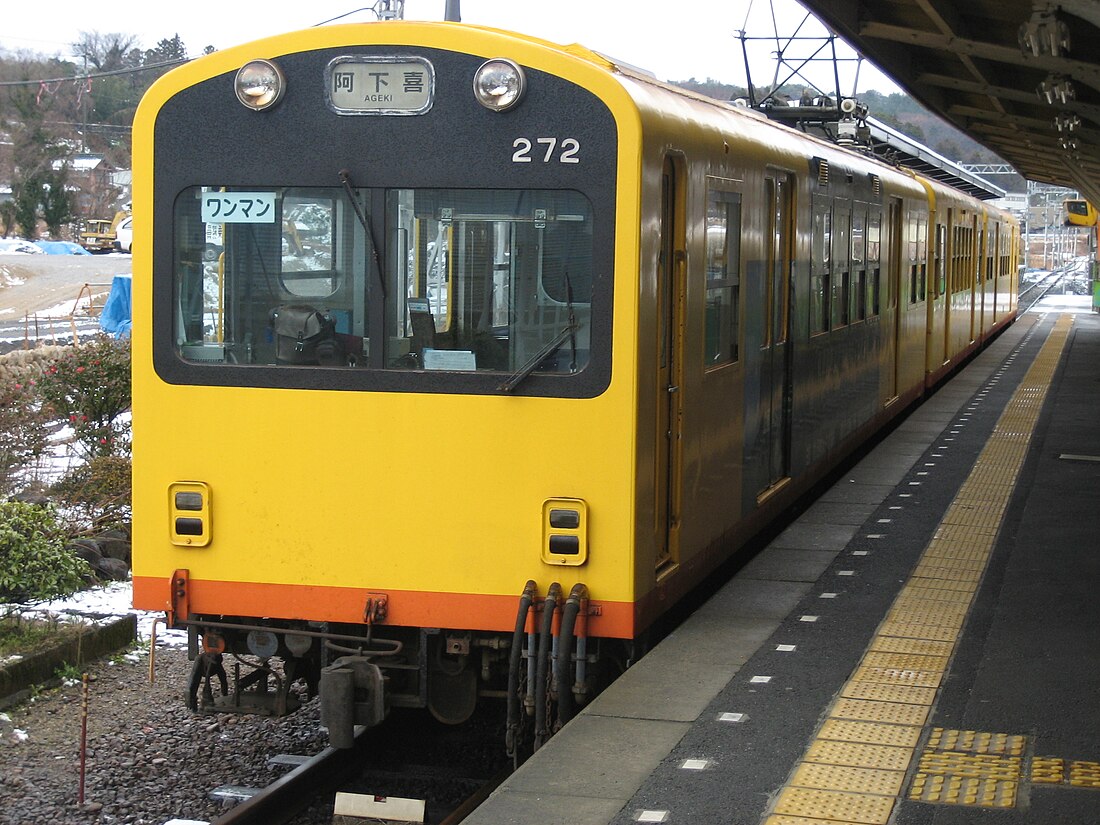Top Qs
Timeline
Chat
Perspective
Sangi Railway Hokusei Line
Narrow gauge (762mm/2'6") railway line in Mie Prefecture, Japan From Wikipedia, the free encyclopedia
Remove ads
The Hokusei Line (北勢線, Hokusei-sen), commonly known as the Sangi Hokusei Line, is a 762 mm (2 ft 6 in) narrow gauge railway line owned and operated by Sangi Railway, a Japanese private railway company. The line runs in Mie Prefecture an connects Nishi-Kuwana Station in Kuwana with Ageki Station in Inabe. For many years, the line was owned by Kintetsu, a major private railway operator, but control was transferred to Sangi in April 2003.
This article needs additional citations for verification. (October 2014) |
The name Hokusei (北勢) means "northern Mie". It is a kanji abbreviation of "north" (北) and "Ise" (伊勢). Ise (as opposed to "Mie") is used in the name because the northern and central parts of present-day Mie Prefecture were called Ise Province during the Edo era before the modern prefecture system was established.
Remove ads
Services
All services are classified as "Local" (普通, futsū), stopping at every station, and are driver-only operations. There are two services per hour during the day, increased to three per hour during morning and evening peaks.
Stations
At Kuwana Station, a short walk from Nishi-Kuwana Station, passengers can transfer to the Kansai Main Line, the Nagoya Line, and the Yōrō Line.
Remove ads
History
The section of the line between Ōyamada Station (大山田駅) (present-day Nishi-Kuwana Station) and Sohara was opened on 5 April 1914 by the Hokusei Railway, with services operated using steam haulage.[1] The line was extended to Ageki on 8 July 1931 and electrified at 600 V DC.[1] On 11 February 1944, the line became part of Mie Kotsu (三重交通),[1] and in 1954, the line voltage was increased to 750 V DC.[citation needed]
Kintetsu acquired the line on 1 April 1965, and from 1 April 2003, it was operated by the Sangi Railway.[1]
Narrow gauge
The line uses an especially narrow 762 mm (2 ft 6 in) track gauge. In the early 20th century, many of Japan's local railway lines were built using this gauge, however the vast majority of them were widened in the mid 20th century. Today, only four of these original 762 mm (2 ft 6 in) gauge lines are left operating regular passenger services, of which the Hokusei Line is the longest. This rarity makes the Hokusei Line (as well as the other 762 mm (2 ft 6 in) gauge lines) popular with railway enthusiasts.
The other lines in Japan using this gauge include the Kurobe Gorge Railway in Toyama, and the Utsube Line and the Hachiōji Line operated by Yokkaichi Asunarou Railway in Mie. Like the Hokusei Line, the Utsube and Hachioji Lines were formerly operated by Kintetsu.
Remove ads
References
Wikiwand - on
Seamless Wikipedia browsing. On steroids.
Remove ads

